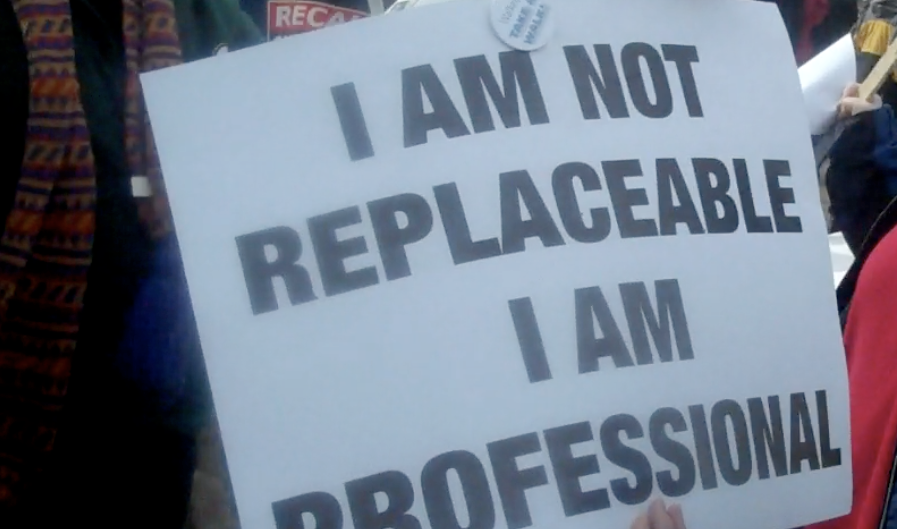Controversial card check drive by AFSCME and SEIU aims for governor’s executive order
Thousands of licensed Minnesota day care providers may soon become unionized at the stroke of Governor Dayton’s pen via executive order as an increasingly contentious, yet largely unknown, organizing campaign apparently nears an end, according to opponents.
The effort to organize the approximately 12,000 licensed home-based daycare providers goes back at least five years. The American Federation of State, County and Municipal Employees (AFSCME) and Service Employees International Union (SEIU) appear to be working in different counties throughout the state to form two separate unions: Child Care Providers Together-AFSCMEand SEIU-Kids First. The unions have patterned the drive after similar campaigns in other states that targeted providers with clients that receive state childcare subsidies.
The process does not involve a secret ballot or a vote, but rather a controversial method called card check. Organizers go door-to-door to childcare providers on the job asking them to sign cards that give the union collective bargaining rights. The unions set out to collect signatures of more than half of the available providers or approximately 3,000 signed cards apiece. After the cards are certified, it is believed Governor Dayton will be asked to sign an executive order designating AFSCME and SEIU as collective bargaining units to negotiate with the state. In addition to personal contributions made by influential union leaders, AFSCME and SEIU PACs contributed $14,000 to Dayton’s 2010 gubernatorial campaign.
“Just about everybody we have spoken to has said they were not told by signing that card they were supporting a union,” said Jennifer Parrish, a Rochester provider who’s leading opposition to the union. “The main theme seems to be people are being told they can sign up for more information or be put on a mailing list.”
Jackie Seifert said that’s what happened to her when a young woman knocked on the door of her daycare business in Rochester.
“She never said she was a union representative and she had no identification as far as a name badge or jacket or any of that,” Seifert said. “It was lunch time when she came and I was busy getting things ready for the kids and she asked me to sign this card for more information.”
Only later, Seifert said, did she learn the woman was a SEIU organizer. She was dismayed to find that the fine print on the card she signed grants the union representation for the purposes of collective bargaining on her behalf.
“I about died I was so embarrassed. I had been had, that was basically how I felt because I was misinformed,” Seifert said.
Seifert demanded and received her signed card back from SEIU. AFSCME appears to have reached its quota of a majority of signed cards ready for certification, after which “yes” cards cannot be rescinded.
Neither AFSCME nor SEIU union representatives returned repeated calls from the Freedom Foundation of Minnesota. In an online interview with providers opposed to the union and posted at childcareinfo.com, the lead organizers for AFSCME and SEIU defended their volunteers and said they received training in best practices.
In other states, daycare providers are deemed employees of the state for purposes of the collective bargaining process. Tom Copeland, a Twin Cities attorney and childcare business expert who supports the organizing drive, says the legal step doesn’t mean the self-employed providers would actually work for the state.
“They’re not an employee of the state. They don’t lose their self-employee control, the state has nothing to say about how they operate, what they charge or what rules they adopt,” Copeland said. “It’s only around negotiating higher subsidy rates and perhaps changes in those regulations and perhaps a better system of grievances and licensing rules, that’s it.”
Licensed providers who oppose unionization have mounted an on-line petition drive to gather enough signatures to present to Governor Dayton before he takes potential action. Governor Dayton’s office did not respond to FFM’s email requests for comment on the issue.
“Do I think he’d sign it?” Copeland said. “I think he would and I think the unions think he would.”
“As a small business owner it’s my right to have my own voice and not be covered under this union and to not have to financially support a union that I don’t believe is going to benefit me or my business,” Jennifer Parrish said. “I’m very confident that if this went to a secret ballot vote where every licensed provider got to vote ‘yes’ or ‘no’ that we’d prevail.”
Home-based childcare provider unions are operating in fourteen states. Yet the union formed in Michigan by the United Auto Workers and American Federation of State, County and Municipal Employees was recently cut off from receiving mandatory dues by state authorities. The Child Care Providers Together Michigan union effort led to lawsuits over designating home-based childcare workers as state employees and deducting dues from subsidies for low-income families. Providers recently reached a settlement to preclude the state of Michigan from tying union membership to state childcare subsidies in the future. A separate class action lawsuit has been filed against union officials on behalf of childcare providers by theNational Right to Work Legal Defense Foundation, seeking repayment of nearly $4 million of dues collected since 2008.

COMMENTS
Please let us know if you're having issues with commenting.